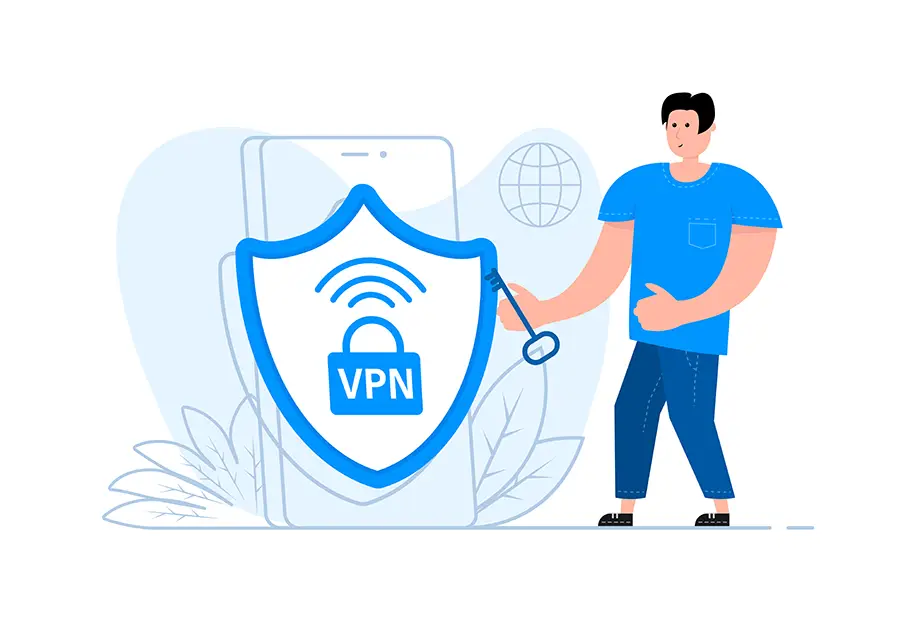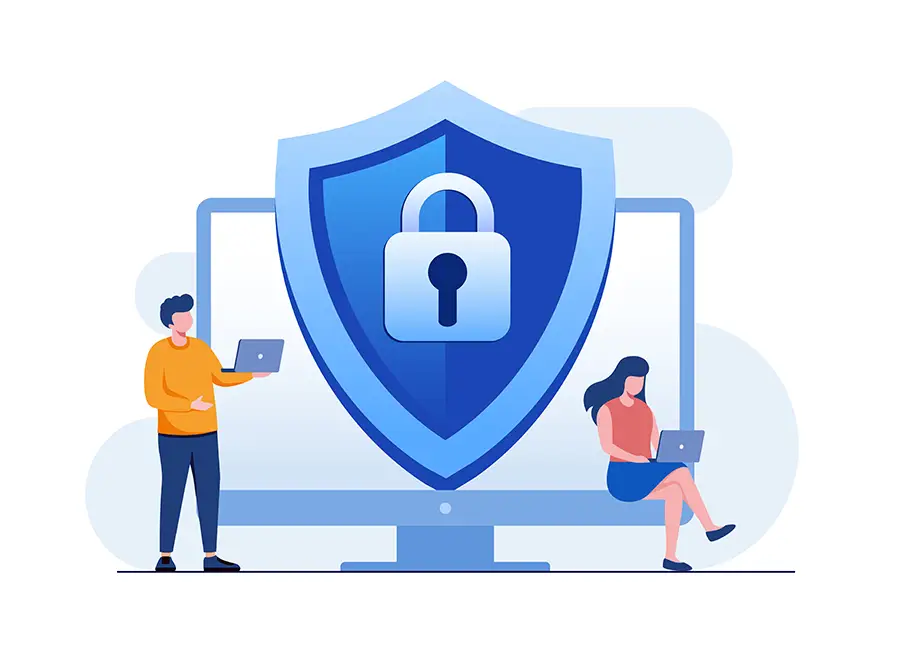In today’s digital world, safeguarding online privacy and security has become a top priority. The need for a reliable method to protect online communications has led to the rise of Virtual Private Networ§ks (VPNs). This comprehensive guide explores the world of VPNs, their benefits, types, and how a VPN works. Read on to discover how a VPN can enhance your online experience.
What is a VPN?
A Virtual Private Network, or VPN, is a technology that makes a secure and encrypted connection between your device and the internet. It lets you maintain privacy while surfing the web, access geo-restricted content, and protect sensitive information from prying eyes.
How a VPN Works
A Virtual Private Network (VPN) makes a protected and encrypted link between your device and the internet, ensuring security. It enables a more private and safe online experience by masking your IP address, location, and online activities. Here’s a step-by-step explanation of how a VPN works:
- You can start a connection to the VPN server by utilizing the VPN client installed on your device.
- The VPN client encrypts your data before it leaves your device. Through this encryption, your data is safeguarded and kept unreadable while it travels over the internet, ensuring its security.
- The encrypted data is transmitted through a secure tunnel to the VPN server, located anywhere globally, depending on the VPN provider’s network.
- The VPN server decrypts the data, effectively “unwrapping” it and revealing its original content.
- The VPN server forwards your decrypted data to the intended destination (website or online service) and retrieves the response.
- After encrypting the response, the VPN server transmits it back to your device via the secure tunnel.
- Your VPN client decrypts the received data, making it accessible to you.
Throughout this process, your original IP address is masked, and your online activities remain hidden from third parties, such as hackers or surveillance agencies.

What are VPN Benefits?
Using a VPN (Virtual Private Network) has various benefits that can enhance your online experience. Below are several advantages of using a VPN:
Enhanced privacy and anonymity
By hiding your IP address and location, a VPN makes it difficult for third parties, such as internet service providers, hackers, or government surveillance agencies, to monitor your online activities. This increased level of privacy can help protect your personal information and online habits from prying eyes.
Secure data transmission
VPNs use robust encryption to secure your data as it travels through the internet. This encryption prevents cyber criminals from intercepting and accessing sensitive information, such as login credentials, financial data, or personal communications. As a result, using a VPN is particularly important when connected to public Wi-Fi networks, which can be susceptible to hacking and data breaches.
Bypassing geo-restrictions
Some websites and online services restrict access based on a user’s geographic location. A VPN allows you to connect to a server in a different country, effectively changing your virtual location and enabling access to content that may be blocked in your region. This feature is especially useful for accessing streaming services, news websites, or social media platforms that may be restricted due to geographic limitations.
Safe online shopping and banking
Incorporating a VPN when making online transactions adds an additional layer of security, safeguarding your financial information from cybercriminals and hackers. Through encryption of your data and concealment of your IP address, a VPN guarantees the confidentiality and security of your sensitive financial information.
Circumventing internet censorship
In some countries, governments impose strict internet censorship, restricting access to certain websites and online services. A VPN can help users bypass these restrictions by connecting to a server in a country with more lenient internet policies, allowing them to access blocked content and maintain their online freedom.
Improved network performance
In some cases, internet service providers may intentionally throttle, or slow down, a user’s connection based on their online activities (e.g., streaming or downloading large files). To prevent such throttling, a VPN can encrypt your data, making it more difficult for your ISP to detect and selectively reduce the speed of specific activities.
Remote access to corporate networks
VPNs enable employees to securely access company resources and internal networks remotely for businesses and organizations. This remote access is particularly useful for remote workers, allowing them to work securely from any location without compromising company data.
In conclusion, using a VPN provides numerous benefits, including enhanced privacy and security, access to geo-restricted content, secure online transactions, and bypassing internet censorship. By understanding these advantages, you can decide whether a VPN is a suitable tool for your online activities.

Types of VPN
There are two primary types of VPNs, each serving different purposes:
Remote Access VPNs
Remote access VPNs enable individual users to securely connect to a remote network or computer over the internet. This type of VPN is particularly popular among remote employees, who can securely access their company’s network from home or while traveling. Remote access VPNs typically consist of two components:
- VPN client: The software installed on the user’s device to initiate and manage the VPN connection.
- VPN server: The remote server the user connects to provides a secure tunnel for data transmission.
Site-to-Site VPNs
Site-to-site VPNs, also known as router-to-router VPNs, securely connect two or more networks or locations. Organizations commonly use this type of VPN to link their offices in different geographic locations, enabling secure communication between them. Site-to-site VPNs can be classified into two categories:
- Intranet-based: This site-to-site VPN connects an organization’s multiple local area networks (LANs) to create a unified network.
- Extranet-based: This site-to-site VPN connects an organization’s LAN to the LAN of a partner organization, allowing them to share resources securely while maintaining their separate networks.

Protect Your Privacy
GreenNet VPN is based in Europe (Estonia) and we are fully compliant with GDPR laws. Thus, user data or logs have never been and won’t be collected by us.
VPN Protocols
VPN protocols determine how data is transmitted between your device and the VPN server. They are crucial in providing secure, reliable, and fast connections. Below are some of the most prevalent VPN protocols, along with their primary features:
OpenVPN
OpenVPN is a widely-used, open-source VPN protocol known for its strong security, reliability, and flexibility. It uses SSL/TLS encryption to secure data transmission and supports User Datagram Protocol (UDP) and Transmission Control Protocol (TCP) for better performance. OpenVPN is compatible with various platforms, including Windows, macOS, Linux, iOS, and Android.
Key features:
- Robust security with up to 256-bit encryption
- Highly configurable and adaptable to different use cases
- Bypasses most firewalls and network restrictions
- Active development and community support
Internet Protocol Security (IPsec)
IPsec is a protocol suite that is utilized to secure data transmission at the IP packet level. It is frequently combined with other VPN protocols, such as L2TP and IKEv2, to create robust and secure VPN connections. IPsec provides data integrity, confidentiality, and authentication features and is commonly used in site-to-site VPN implementations.
Key features:
- Strong security with support for various encryption algorithms
- Compatible with most networking equipment and devices
- Scalable and suitable for large-scale deployments
- It can be combined with other protocols for enhanced security
Layer 2 Tunneling Protocol (L2TP)
L2TP is a VPN protocol that encapsulates data packets and creates a virtual tunnel between your device and the VPN server. However, L2TP does not provide any encryption by itself. As a result, it is often used in combination with IPsec (L2TP/IPsec) to secure data transmission.
Key features:
- Supports multi-protocol VPNs and works well with various network types
- Easy to set up and compatible with most devices
- Reliable and stable connections
- Enhanced security, when combined with IPsec
Internet Key Exchange version 2 (IKEv2)
IKEv2 is a secure and efficient VPN protocol developed by Microsoft and Cisco. It is particularly suitable for mobile devices, thanks to its ability to maintain a VPN connection while switching between networks (e.g., Wi-Fi to mobile data). IKEv2 uses IPsec for data encryption, providing fast connection speeds and strong security features.
Key features:
- Excellent for mobile devices with support for network switching
- Fast connection speeds and strong security with IPsec encryption
- Compatible with Windows, macOS, iOS, and some Android devices
- Resistant to network interruptions and provides quick reconnection
Point-to-Point Tunneling Protocol (PPTP)
PPTP, created by Microsoft in the late 1990s, is one of the earliest VPN protocols. Although it is easy to set up and compatible with most devices, PPTP is considered less secure than other modern protocols due to known vulnerabilities. As a result, it is generally not recommended for use in situations where strong security and privacy are required.
Key features:
- Easy to set up and widely supported on various devices
- Faster connection speeds due to lower encryption levels
- Not suitable for high-security applications due to known vulnerabilities
- Largely considered outdated and less secure than other protocols
V2Ray
V2Ray, or Project V, is a modular network proxy tool and framework that supports various protocols, including its own VMess protocol. While not a VPN protocol in the traditional sense, V2Ray provides similar functionality by enabling users to create secure, encrypted tunnels to bypass internet censorship and maintain privacy.
V2Ray is particularly popular in countries with strict internet censorship. It is designed to disguise traffic as normal HTTPS traffic, making it difficult for firewalls to detect and block the connection. V2Ray can be combined with other VPN protocols like Shadowsocks to enhance security and bypass restrictions.
Key features:
- Modular design with support for multiple protocols, including VMess
- Effective at bypassing internet censorship and disguising traffic
- Flexible and customizable, allowing users to create tailored solutions
- Active development and community support
Secure Socket Tunneling Protocol (SSTP)
SSTP is a VPN protocol developed by Microsoft that uses Secure Socket Layer (SSL) encryption to create secure connections over the internet. Like OpenVPN, SSTP establishes a VPN tunnel by encapsulating data packets within an SSL/TLS channel. This approach allows SSTP to bypass most firewalls and network restrictions, as the traffic appears like regular HTTPS traffic.
SSTP is natively supported on Windows devices, but its compatibility with other platforms may be limited. Although some third-party solutions enable SSTP usage on macOS, Linux, iOS, and Android, it is not as widely adopted as other protocols like OpenVPN or IKEv2.
Key features:
- Strong security with SSL/TLS encryption, similar to OpenVPN
- Bypasses most firewalls and network restrictions
- Native support on Windows devices
- Limited compatibility with non-Windows platforms
Conclusion
A Virtual Private Network is essential for anyone concerned about their online privacy and security. By understanding the benefits, types, and setup process of a VPN, you can make an informed decision about the right service for your needs. When selecting a VPN provider, consider security features, server locations, speed, and price. Enjoy a safer, more private online experience with the help of a reliable VPN service.
FAQs
While a VPN encrypts your data and routes it through a remote server, this process may cause a slight decrease in connection speed. However, top-tier VPN providers invest in high-speed servers and optimized networks to minimize the impact on speed.
In most countries, using a VPN is perfectly legal. However, some countries restrict or ban VPN usage. Before using a VPN, becoming acquainted with local laws and regulations is essential.
Most VPN providers allow you to use their service on multiple devices simultaneously, but the exact number may vary. Check the provider’s terms and conditions for device limits.




